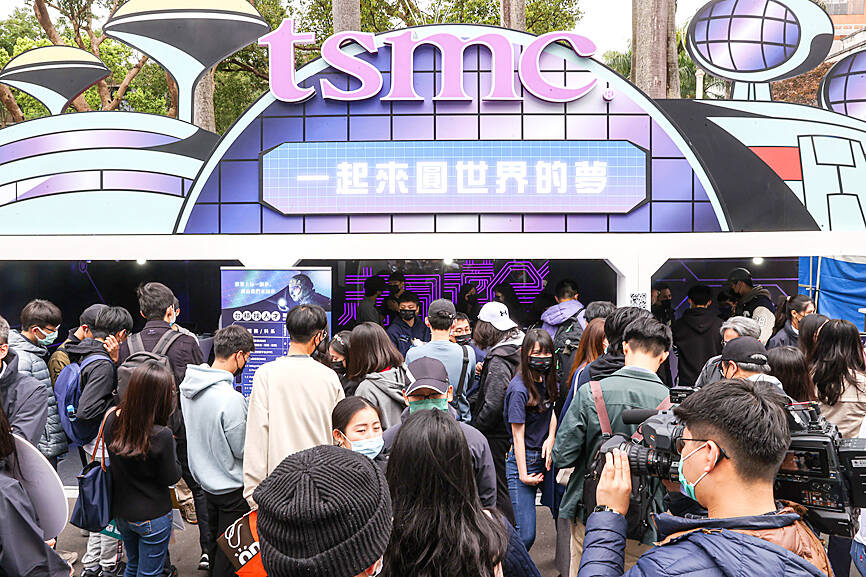Taiwan Semiconductor Manufacturing Co’s (TSMC, 台積電) revenue from its biggest customer last year rose 30.64 percent from the previous year, financial data released by the company on Friday showed.
While the world’s largest contract chipmaker did not identify the customer, it was widely believed to be Apple Inc.
TSMC’s revenue from the customer totaled about NT$529.65 billion (US$17.32 billion) last year, the data showed.

Photo: CNA
It was the first time a single customer contributed more than NT$500 billion to TSMC’s annual revenue.
However, the revenue generated by the customer accounted for 23 percent of TSMC’s total sales, down from 26 percent in 2021.
The chipmaker’s second-largest customer in terms of sales, thought to be US chip designer Advanced Micro Devices Inc (AMD), also saw its contribution fall below 10 percent of TSMC’s total sales, but no further details were released.
Analysts said TSMC’s automotive chip sales last year rose 74 percent from 2021, beating the 59 percent and 28 percent growth in sales of chips used in high-performance computing devices and smartphones respectively, which explains the declines in Apple and AMD’s contributions to TSMC’s sales.
TSMC’s biggest source of revenue last year was the US market, which accounted for 65.96 percent of its total sales at NT$1.49 trillion.
It was followed by China (10.82 percent) at NT$245.17 billion, Taiwan (9.29 percent) at NT$210.47 billion and Japan (5.26 percent) at NT$119.099 billion.
TSMC last year posted a net profit of more than NT$1 trillion for the first time in its history, with net income rising 70.4 percent to NT$1.01 trillion, and earnings per share growing from NT$23.01 to NT$39.2.

GROWING OWINGS: While Luxembourg and China swapped the top three spots, the US continued to be the largest exposure for Taiwan for the 41st consecutive quarter The US remained the largest debtor nation to Taiwan’s banking sector for the 41st consecutive quarter at the end of September, after local banks’ exposure to the US market rose more than 2 percent from three months earlier, the central bank said. Exposure to the US increased to US$198.896 billion, up US$4.026 billion, or 2.07 percent, from US$194.87 billion in the previous quarter, data released by the central bank showed on Friday. Of the increase, about US$1.4 billion came from banks’ investments in securitized products and interbank loans in the US, while another US$2.6 billion stemmed from trust assets, including mutual funds,

Micron Memory Taiwan Co (台灣美光), a subsidiary of US memorychip maker Micron Technology Inc, has been granted a NT$4.7 billion (US$149.5 million) subsidy under the Ministry of Economic Affairs A+ Corporate Innovation and R&D Enhancement program, the ministry said yesterday. The US memorychip maker’s program aims to back the development of high-performance and high-bandwidth memory chips with a total budget of NT$11.75 billion, the ministry said. Aside from the government funding, Micron is to inject the remaining investment of NT$7.06 billion as the company applied to participate the government’s Global Innovation Partnership Program to deepen technology cooperation, a ministry official told the

Taiwan Semiconductor Manufacturing Co (TSMC, 台積電), the world’s leading advanced chipmaker, officially began volume production of its 2-nanometer chips in the fourth quarter of this year, according to a recent update on the company’s Web site. The low-key announcement confirms that TSMC, the go-to chipmaker for artificial intelligence (AI) hardware providers Nvidia Corp and iPhone maker Apple Inc, met its original roadmap for the next-generation technology. Production is currently centered at Fab 22 in Kaohsiung, utilizing the company’s first-generation nanosheet transistor technology. The new architecture achieves “full-node strides in performance and power consumption,” TSMC said. The company described the 2nm process as

Even as the US is embarked on a bitter rivalry with China over the deployment of artificial intelligence (AI), Chinese technology is quietly making inroads into the US market. Despite considerable geopolitical tensions, Chinese open-source AI models are winning over a growing number of programmers and companies in the US. These are different from the closed generative AI models that have become household names — ChatGPT-maker OpenAI or Google’s Gemini — whose inner workings are fiercely protected. In contrast, “open” models offered by many Chinese rivals, from Alibaba (阿里巴巴) to DeepSeek (深度求索), allow programmers to customize parts of the software to suit their